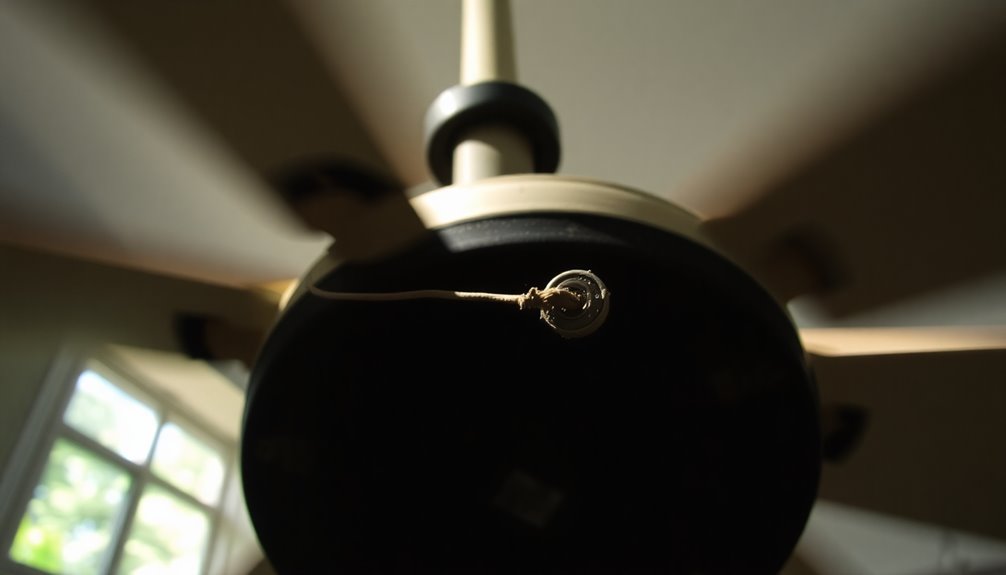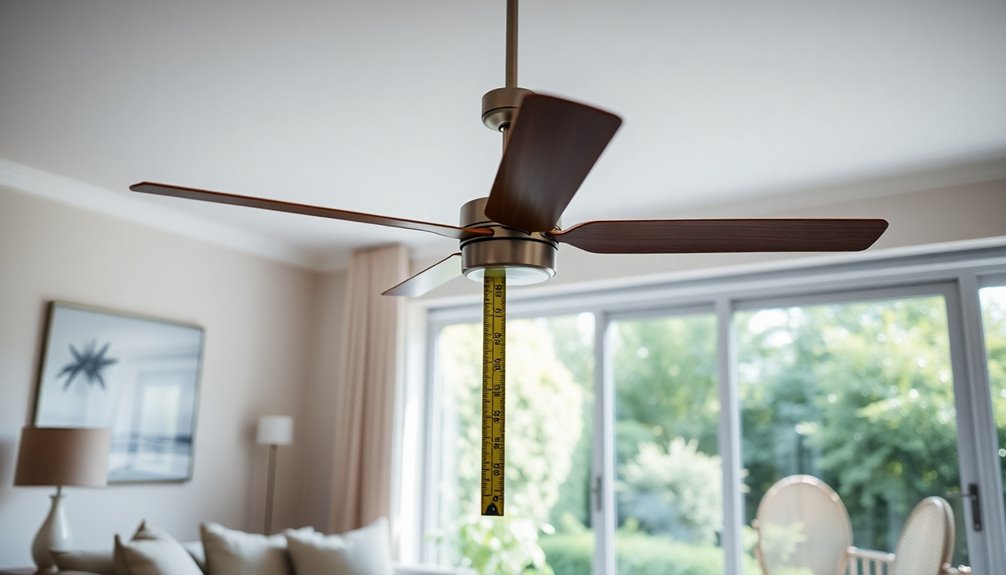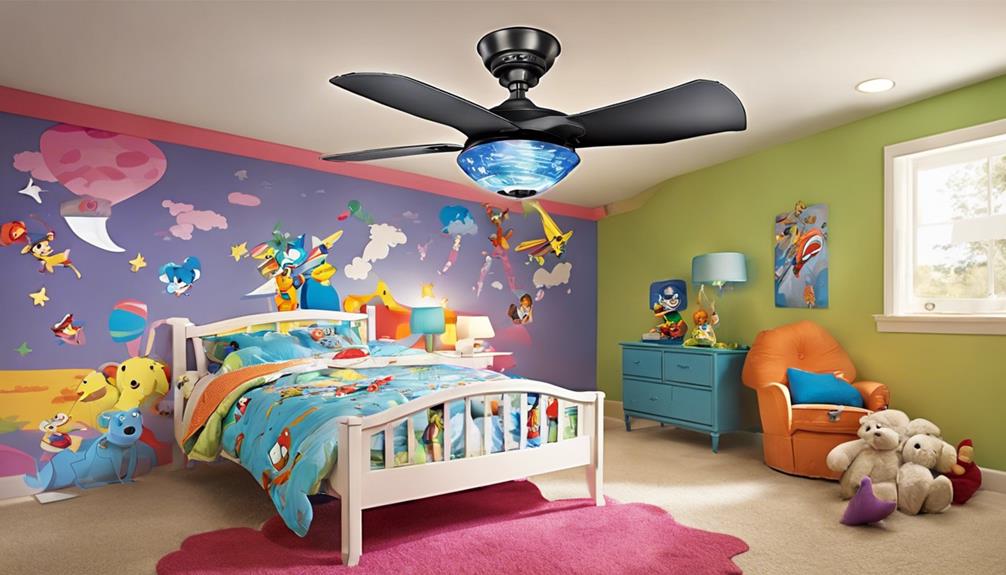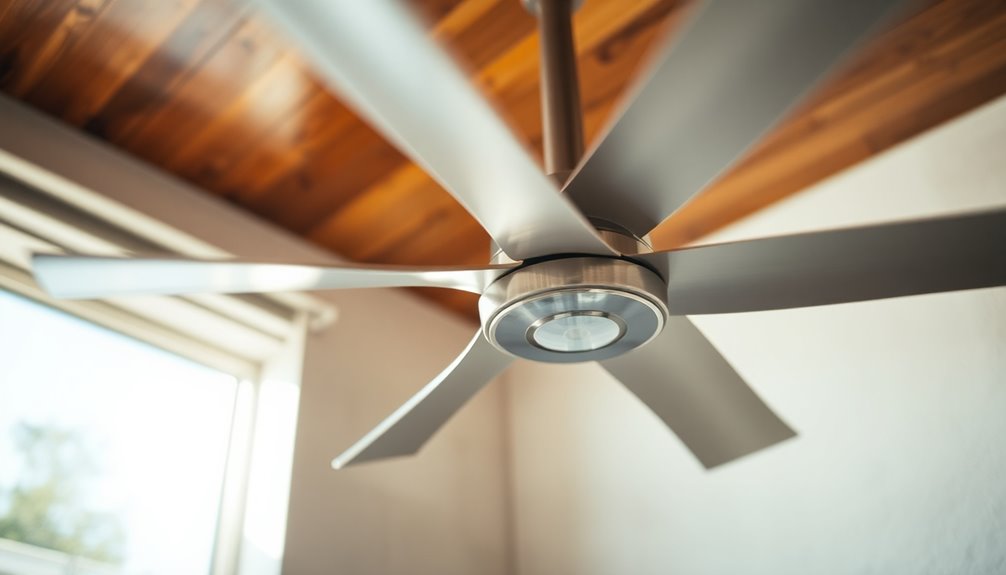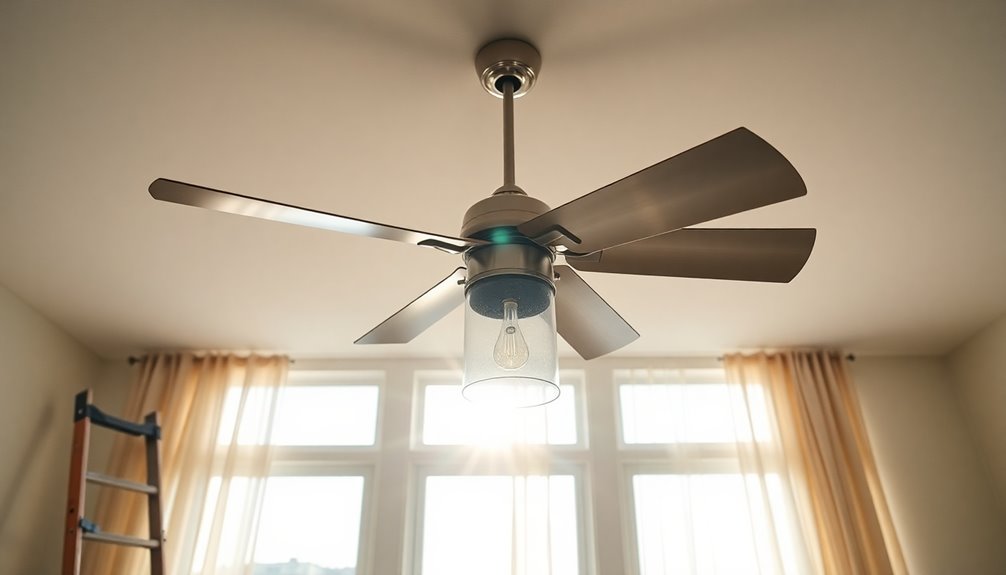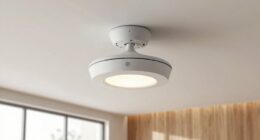If your ceiling fan's making noise, it could be due to several common issues. Loose screws or unbalanced blades often lead to rattling or humming sounds. Dirty motor bearings can create grinding noises, while electrical problems might cause a constant hum. Checking for dust buildup or obstructions can also help reduce noise. Regular maintenance, like tightening screws and cleaning, can keep your fan quiet. If the noise persists after these checks, there may be deeper issues at play. Stick around to uncover more tips on diagnosing and fixing those pesky sounds to restore your fan's peaceful operation.
Key Takeaways
- Loose screws or bolts can cause rattling or clicking sounds in the ceiling fan.
- Unbalanced blades may lead to vibrations, resulting in humming or buzzing noises.
- Dirty or dry motor bearings can create grinding noises, indicating lubrication is needed.
- Electrical issues, such as a malfunctioning capacitor, can produce persistent humming sounds.
- Worn-out bearings often lead to grinding or squeaking noises in the fan.
Common Causes of Ceiling Fan Noise

Ceiling fan noise can be a frustrating distraction in your home. One common cause of these annoying sounds is loose screws, bolts, or fasteners in the ceiling fan assembly. When these parts aren't secure, you might hear rattling or clicking noises as the fan operates.
Another issue could be unbalanced blades; if they're warped or not aligned properly, you'll likely notice vibrations that lead to humming or buzzing noise.
Additionally, dirty or dry motor bearings can result in a grinding noise, indicating that your fan needs lubrication and a good cleaning. Sometimes, an electrical problem, such as a malfunctioning capacitor or motor, can produce unusual sounds like a persistent humming noise.
If your ceiling fan was installed improperly or mounted incorrectly, you might experience rattling or clicking as well.
Lastly, keep an eye out for damaged parts; any broken components can also contribute to unwanted noise.
Addressing these common causes can help restore peace and quiet to your space, allowing you to enjoy the cooling benefits of your ceiling fan without the distraction of irritating sounds.
Identifying the Source of Noise

To tackle ceiling fan noise effectively, it's important to pinpoint the exact source of the sound. Start by listening carefully while the fan operates. Determine if the noise is coming from the motor, blades, or mounting hardware.
Here's how you can identify the source:
- Inspect the Blades: Look for any wobbling or shaking. An imbalance or loose components can contribute considerably to noise.
- Examine the Motor: Check the motor housing and bracket for visible damage or loose screws. Rattling sounds often indicate issues here.
- Clear Debris: Accumulated dirt or debris on the blades and motor can disrupt performance, leading to increased noise levels. Verify everything is clean.
- Test Speed Settings: Try adjusting the fan's speed. Noise levels may vary with speed, helping you isolate whether the issue relates to the motor function or blade performance.
Fixing Noisy Ceiling Fans

Wondering how to fix that pesky noise coming from your ceiling fan? Start by inspecting and tightening all screws and bolts on the fan and its mounting bracket. Loose parts often contribute to common noises like rattling or clicking.
Next, check the fan blades for balance. An unbalanced fan can cause wobbling and associated noise, so consider using a blade balancing kit to correct any weight distribution issues.
If you're hearing grinding or squeaking, it's crucial to clean and lubricate the motor bearings regularly. Dirt buildup can lead to friction, causing these annoying sounds.
On the other hand, if the humming or buzzing noise persists, examine the motor and wiring. Electrical issues can certainly be the culprit, and if you can't resolve them, don't hesitate to seek professional help.
Finally, take a close look at the fan blades and other components for any visible damage. Addressing worn-out parts promptly can greatly reduce noise and prolong the life of your fan.
With these steps, you'll be well on your way to enjoying a quieter ceiling fan!
Maintenance Tips for Quiet Operation

Keeping your ceiling fan running quietly involves a few simple maintenance practices that anyone can follow. By incorporating these tips, you can enhance performance and enjoy a peaceful environment.
- Regularly clean ceiling fan blades and motor housing. This prevents dust buildup, which can lead to increased noise and reduced efficiency.
- Inspect and tighten all screws, bolts, and fasteners. Periodically checking these components helps eliminate rattling and clicking sounds caused by loose parts.
- Lubricate motor bearings annually. Using appropriate machine oil guarantees smooth operation and minimizes grinding or squeaking noises.
- Use a ceiling fan balancing kit. This helps you assess and correct any blade imbalance, preventing wobbling and associated noise during operation.
Additionally, don't forget to schedule professional maintenance checks. These can identify and address potential issues before they escalate into noisy problems.
Repairing Loose or Worn Parts

Addressing loose or worn parts in your ceiling fan is essential for maintaining a quiet and efficient operation. Loose screws, bolts, and fasteners can lead to rattling or clicking noises, so make sure to tighten screws regularly. Worn-out components, like bearings or blade brackets, may cause grinding or squeaking sounds due to increased friction. Regular maintenance can help prevent these issues.
To assist you in keeping your fan quiet, here's a quick reference table:
| Issue | Solution |
|---|---|
| Loose screws | Tighten screws |
| Worn-out components | Replace with new parts |
| Blade brackets misaligned | Securely fasten blade brackets |
| Motor housing wear | Inspect motor housing regularly |
Balancing Ceiling Fan Blades

When your ceiling fan blades are unbalanced, it can lead to annoying wobbling and increased noise, such as clicking or buzzing.
To make certain your fan operates quietly and efficiently, it's crucial to address this issue. Here are some steps to help you balance your ceiling fan blades:
- Inspect for Dirt: Check for any accumulation of dirt or debris on the blades. Cleaning them can sometimes resolve the imbalance.
- Observe Motion: Watch the fan in motion. If you notice wobbling or shaking, it's likely a sign of blade imbalance.
- Use a Balancing Kit: Consider using a blade balancing kit. These kits assist in adding weight to lighter blades or adjusting the blade pitch for better balance.
- Make Adjustments: After identifying the unbalanced ceiling fan blades, make necessary adjustments to make certain even weight distribution.
Regularly checking and balancing your fan can extend its lifespan and reduce noise levels, making sure of peak performance in your living space.
Don't wait for the noise to become a nuisance; take action to enjoy a quieter and more comfortable environment!
Addressing Motor and Bearing Issues

Ceiling fan noise often stems from motor and bearing issues, which can disrupt the peace in your home. If you hear humming or buzzing noises, it might be a sign of worn or damaged motor windings.
Dust accumulation on motor bearings can also increase friction, leading to grinding or squeaking noises during operation. To keep your fan running smoothly, regular lubrication of motor bearings is essential. Insufficient lubrication can cause wear and tear, ultimately shortening the fan's lifespan.
Additionally, check the motor housing and mounting for loose or damaged components. Loose or misaligned motor components can create vibrations and noise, so securing these parts can help mitigate sound issues.
If you've addressed these concerns and the noise persists, it could indicate a failing motor or damaged bearings. In such cases, further inspection may be necessary to determine the best course of action.
When to Call a Professional

How do you know when it's the right moment to call a professional for your ceiling fan? If you're dealing with a noisy ceiling fan that won't quiet down despite your best efforts, it's vital to recognize the signs that indicate you need a professional diagnosis.
Here are some common reasons to reach out for help:
- Persistent Noises: If unusual sounds continue even after maintenance, there could be a deeper issue.
- Wobbling or Vibrating: Excessive movement after balancing attempts may require professional intervention to evaluate installation and support.
- Signs of Overheating: A burning smell or smoke means you should immediately call a licensed electrician to avoid fire hazards.
- Complex Electrical Problems: If you suspect damaged wiring or motor issues, it's important to consult a qualified expert to guarantee safety.
Ignoring these warning signs can lead to more severe problems, including potential hazards.
Don't take chances with your ceiling fan running erratically; if you notice any of these issues, it's advisable to get a professional involved to assess and resolve the situation.
Frequently Asked Questions
How Do I Stop My Ceiling Fan From Making Noise?
To stop your ceiling fan from making noise, start by tightening all screws and bolts on the fan and its mounting bracket.
Regularly clean and lubricate the motor bearings to prevent grinding or squeaking sounds.
Check the blades for warping or damage, and use a balancing kit if needed.
Adjust the blade pitch to optimize airflow and reduce humming.
If noise persists, consider consulting a professional for further assistance.
Should I Be Worried if My Fan Is Making Noise?
If your fan's making noise, it can feel like a thousand tiny gremlins are wreaking havoc in your home.
You should definitely take it seriously. Certain sounds might signal loose parts or even electrical issues that could lead to bigger problems.
Don't ignore persistent grinding or sizzling; these could indicate serious hazards.
Regular maintenance helps, but if the noise continues, you might want to consult a professional for peace of mind and safety.
How to Fix Ceiling Fan Clicking Noise?
To fix a clicking noise from your ceiling fan, start by turning off the power.
Check for any loose screws or bolts on the blades and motor assembly, tightening them as needed.
Inspect the blades for bends or damage, ensuring they're aligned properly.
Make sure the blade brackets are secure and evenly spaced.
If the noise continues, remove light fixture components to check for loose connections or damaged parts that could be causing the issue.
Why Does My Ceiling Fan Sound Like Its Grinding?
If your ceiling fan sounds like it's grinding, it's likely due to worn motor bearings or insufficient lubrication.
Dust buildup on the blades and motor can also increase friction and lead to that grinding noise.
You might want to check for misalignment in the blades, as this can create uneven pressure on the motor.
Regular maintenance, like cleaning and lubricating, can help prevent these issues and keep your fan running smoothly.
Conclusion
To summarize, dealing with a noisy ceiling fan can be frustrating, but with the right approach, you can restore peace to your space. Remember that about 30% of ceiling fans experience noise issues at some point, often due to improper installation or wear and tear. By regularly maintaining your fan and addressing any problems early, you can enjoy a quiet, comfortable environment. If issues persist, don't hesitate to call a professional to guarantee everything's in top shape.
